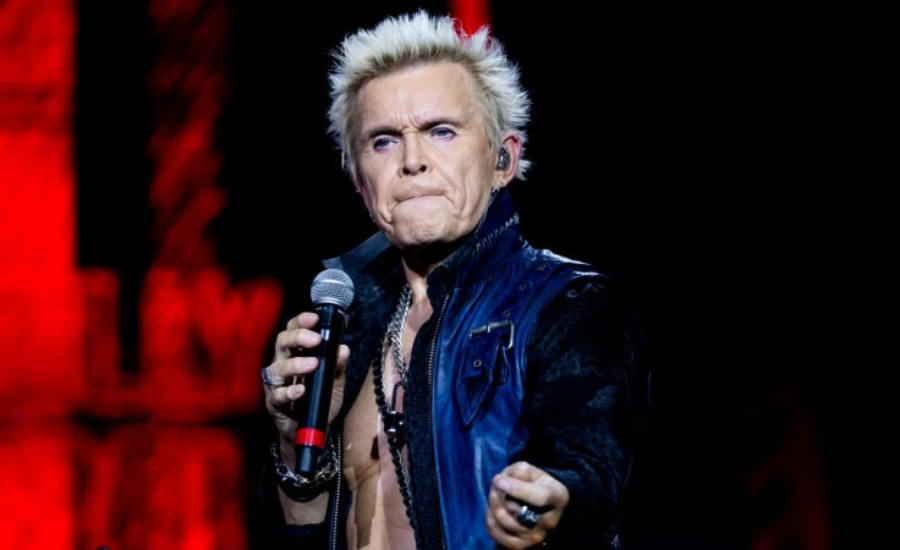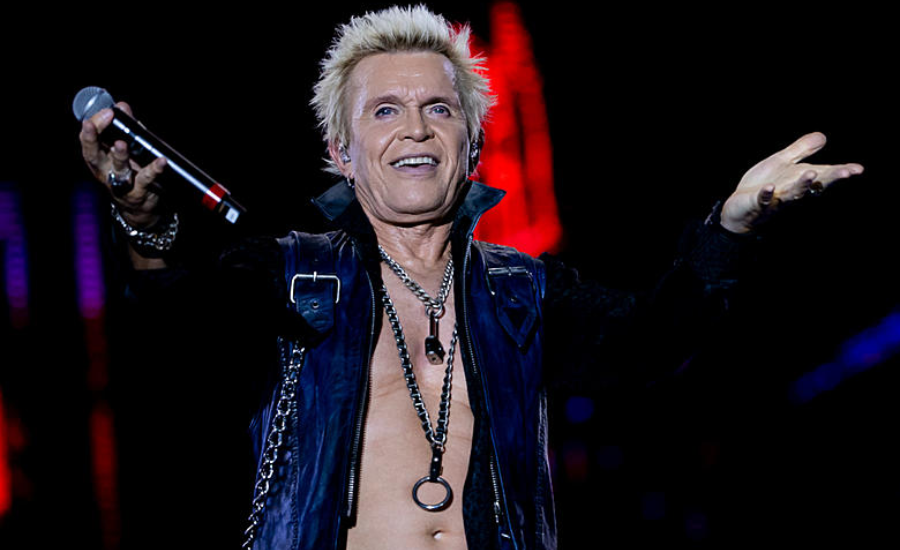Billy Idol is a name that resonates deeply within the rock ‘n’ roll world. Known for his signature sneer, rebellious attitude, and chart-topping hits like “White Wedding,” “Rebel Yell,” and “Dancing with Myself,” Idol has solidified himself as one of the most influential figures in rock music. But beyond his music, his net worth has been a point of intrigue for many fans and industry insiders alike. In this article, we will delve into Billy Idol’s estimated net worth, uncover the sources of his wealth, and examine his career milestones and influence that have contributed to his enduring success.
Who Is Billy Idol?

Billy Idol, born William Michael Albert Broad on November 30, 1955, in Stanmore, England, stands as one of rock music’s most defining figures. His journey began in London’s vibrant punk scene in the late 1970s, where he emerged as a charismatic frontman with the band Generation X. Idol and Generation X helped lay the groundwork for punk’s mainstream crossover, injecting energy and rebellion into the music landscape. As the group gained momentum, Idol’s raw charisma and rebellious attitude caught the attention of fans and industry insiders alike, eventually propelling him toward a solo career. This shift marked a turning point that would cement his influence on rock music, especially as he began to fuse punk’s intensity with accessible pop hooks, creating a sound that was edgy yet irresistibly catchy.
Stepping out as a solo artist in the early 1980s, Idol cultivated a persona that resonated on both sides of the Atlantic. His platinum-blonde hair, leather-clad wardrobe, and signature snarl became synonymous with rock rebellion and style. Songs like “White Wedding,” “Rebel Yell,” and “Dancing with Myself” were not only chart-toppers but also cultural touchstones that captured the spirit of the time. Idol’s music was characterized by pulsing rhythms, electrifying guitar riffs, and anthemic choruses, which quickly became staples on MTV, bringing him into the homes of millions of fans worldwide. His appeal lay in his ability to blend punk rock’s raw energy with the broader appeal of rock and pop, making him a favorite among listeners who were drawn to his unapologetic, high-energy performances.
Beyond his music, Idol’s influence extended into film and pop culture, expanding his legacy beyond the stage. He appeared in films like The Doors (1987) and The Wedding Singer (1998), where he embraced his rock-star image, endearing himself to new audiences and further securing his place in entertainment history. Idol’s impact on both punk and mainstream rock has endured, inspiring generations of musicians and fans. Today, he remains a powerful presence in rock music, continuously touring and captivating audiences with his timeless hits and signature style. Billy Idol’s legacy as a trailblazer in punk and rock continues to thrive, a testament to his unyielding passion and lasting influence on music and culture.
Billy Idol: Early Life And The Seeds Of Rock Stardom
Billy Idol, born William Michael Albert Broad on November 30, 1955, in Stanmore, Middlesex, England, developed a deep passion for music from a young age. His early musical influences and rebellious spirit led him to explore punk rock, a genre that would shape his career. Idol first made his mark in the music scene as a member of the punk band Chelsea, where he honed his musical style and stage presence. However, it was his involvement with the iconic British punk group Generation X, formed in 1976, that truly defined his identity as a captivating frontman. As the lead singer of Generation X, Idol’s high-energy performances, unique voice, and charismatic persona helped propel the band into the punk rock spotlight, cementing his place as a rising star in the UK’s vibrant music scene.
Though Generation X brought Billy Idol significant recognition, he knew that to fully express his artistic vision and reach a broader audience, he needed to carve out his own path. In the early 1980s, Idol made the bold decision to leave the band and embark on a solo career. This move marked a turning point in his life and in the trajectory of his career. Idol’s decision to pursue a solo career allowed him the creative freedom to experiment with new sounds and styles, blending his punk rock roots with a more mainstream rock sound. The decision to step away from his punk band was not without risks, but it would ultimately prove to be one of the most defining moves of his career.
Billy Idol’s move to New York City in the early 1980s marked the beginning of a new chapter in his career. It was in the vibrant music scene of New York that he collaborated with renowned producer Keith Forsey, setting the stage for his breakthrough as a solo artist. Together, they produced the self-titled debut album, which included the hit singles “White Wedding” and “Hot in the City.” These tracks showcased Idol’s ability to blend punk energy with more accessible rock melodies, propelling him into mainstream success. This partnership with Forsey marked the start of a new era in Idol’s musical journey, one that would elevate him to international stardom and solidify his status as one of rock’s most iconic figures. The move to New York, combined with his bold creative choices, ultimately set the foundation for the stellar solo career that followed.
Billy Idol: Breakthrough And Mainstream Success

Billy Idol’s self-titled debut album, released in 1982, marked the beginning of his solo career and introduced the world to his unique blend of punk, rock, and pop. The album included breakout hits like “White Wedding” and “Hot in the City,” both of which catapulted Idol into mainstream fame. The commercial success of the album paved the way for Billy Idol’s continued dominance in the rock scene, making him a household name.
In 1983, Idol released his sophomore album, Rebel Yell, which further solidified his position as one of the era’s most dynamic rock stars. With hits like the title track “Rebel Yell” and “Eyes Without a Face,” the album not only achieved double platinum status in the U.S. but also became anthemic for fans of both punk and mainstream rock. The album’s success was further amplified by its heavy rotation on MTV, where Idol’s striking image and captivating performances made him a staple in the music video era.
The 1980s were marked by Billy Idol’s continuous rise. Albums such as Whiplash Smile (1986) and Charmed Life (1990) followed, showcasing his evolution as an artist while maintaining the raw energy and charisma that defined his early work. Through these years, Billy Idol’s iconic status was only further cemented, and his combination of punk ethos with mainstream appeal created a lasting legacy in rock music.
Billy Idol’s Multifaceted Career: Acting, Ventures, And More

While Billy Idol is primarily celebrated for his groundbreaking contributions to rock music, his career spans beyond the recording studio and live performances. In addition to his musical success, Idol ventured into acting, making his film debut in 1987 in Oliver Stone’s The Doors. In the film, he played a small yet memorable role, marking the beginning of his exploration of the entertainment world beyond music. Although acting never became his primary focus, Idol’s appearances in films and TV shows showcased his ability to diversify his talents and expand his public image. This foray into acting allowed him to reach new audiences and add another layer to his iconic persona, further solidifying his place in popular culture. His roles, though limited, were a testament to his versatility and a natural extension of the rebel image that made him a rock legend.
Alongside his music and acting ventures, Billy Idol has pursued various business opportunities, leveraging his fame and rebellious image to expand his brand. Over the years, he has partnered with multiple companies for endorsements, using his rock star persona to promote products that align with his brand identity. His image—characterized by his platinum blonde hair, leather jackets, and defiant attitude—has become synonymous with the essence of rock ‘n’ roll. This connection has made him a sought-after figure for commercials, collaborations, and marketing campaigns. From lifestyle products to fashion lines, Idol’s brand appeal extends far beyond his music, creating a lucrative income stream that complements his artistic career. These partnerships have not only increased his financial standing but also helped cement his place as an influential figure in popular culture.
Billy Idol’s business ventures have been an integral part of his continued success, allowing him to diversify his portfolio and build his wealth outside of the music industry. His ability to market himself as more than just a musician has contributed significantly to his financial standing. His rebellious, larger-than-life persona has resonated with consumers, making him an ideal candidate for partnerships with brands looking to tap into the rock ‘n’ roll spirit. By embracing these opportunities, Idol has effectively turned his rock stardom into a multi-faceted career that includes acting, endorsements, and business ventures, all of which have helped him maintain his status as an influential figure in entertainment. These endeavors showcase his business acumen and his understanding of the power of his brand, ensuring that Billy Idol remains relevant and financially successful in the ever-changing entertainment landscape.
Billy Idol: Touring, Concerts, And Live Performances

A cornerstone of Billy Idol’s enduring success has been his exceptional live performances. Idol is renowned for his electrifying stage presence, and it’s this dynamic energy that has captivated audiences for decades. His live shows are not just concerts; they are high-energy events that draw fans from around the world. The sheer force of his charisma, combined with his commitment to delivering an unforgettable experience, has made him one of the most sought-after live performers in rock music. Whether it’s the charged atmosphere of his solo hits like “Rebel Yell” or the intensity of his classic punk-inspired tracks, Idol’s ability to connect with his audience through raw emotion and powerful delivery ensures that his concerts remain a major highlight of his career.
Touring has been a crucial driver of Billy Idol’s financial success, contributing significantly to his overall net worth. Throughout his career, his consistent touring schedule has not only kept his music in the public eye but also generated substantial revenue from ticket sales. Concertgoers flock to see Idol perform live, often willing to pay premium prices to witness his legendary performances. In addition to ticket sales, Billy Idol has capitalized on merchandise sales, offering fans a chance to purchase memorabilia and exclusive items that further enhance their concert experience. These sales, along with VIP packages that offer fans unique, intimate experiences, have become a substantial source of income for Idol, allowing him to maintain his financial standing while continuing to build his fan base.
Perhaps what makes Billy Idol’s live performances so enduring is his ability to engage with fans across different generations. Over the years, his music has transcended age groups, and his shows are a gathering point for fans who have grown up listening to his hits as well as newer generations discovering his music through streaming platforms and social media. This cross-generational appeal is a testament to his timeless relevance in the ever-evolving music landscape. By maintaining a constant presence on the road, Idol reinforces his status as one of rock’s most iconic and influential figures. His tours are not just about performing; they are about maintaining a connection with his loyal audience while introducing his music to new fans, securing his place as a perpetual force in the music industry.
Music Sales And Royalties
Billy Idol’s music catalog is one of the main pillars of his financial success. With millions of albums and singles sold globally, Idol’s royalties from record sales and streaming services have contributed significantly to his net worth. Albums like Rebel Yell and Whiplash Smile continue to generate income through both physical sales and digital platforms. Even as newer music takes center stage, Billy Idol’s classics remain in heavy rotation on radio, streaming platforms, and television shows, ensuring that his legacy continues to pay dividends.
Tour Revenues And Concerts
The live performance aspect of Billy Idol’s career remains one of the most lucrative sources of income. With numerous global tours under his belt, his concerts consistently attract large crowds. Fans are drawn not only to his nostalgic 80s hits but also to his compelling stage presence, making his tours a profitable endeavor. From ticket sales to VIP experiences, and exclusive merchandise, the revenue generated from live performances has been a major contributor to his wealth.
Acting Appearances And Endorsements
Billy Idol’s ventures into acting and endorsements have also played a role in his financial success. Although not as extensive as his music career, his acting roles in films and TV, combined with lucrative endorsement deals, have bolstered his financial portfolio. Brands and products often align with his rebellious rock ‘n’ roll persona, making him a valuable marketing figure in various industries.
Billy Idol’s Influence On Music: Legacy And Impact
Billy Idol’s influence on rock music and pop culture is truly immeasurable. As one of the most iconic figures in the music industry, his distinct voice, bold fashion choices, and rebellious spirit have not only defined his career but also shaped the broader landscape of rock music. Idol’s unique blend of punk rock aggression with mainstream appeal helped bridge the gap between underground music and mainstream stardom. His early days with Generation X were pivotal in the rise of the punk movement, but it was his solo career that truly propelled him into the cultural zeitgeist. With hits like “White Wedding” and “Rebel Yell,” Idol became an emblem of the 1980s rock scene, capturing the attention of millions with his energetic stage presence and unmistakable style.
What sets Billy Idol apart from many of his contemporaries is his remarkable ability to evolve with the changing tides of music while maintaining his core identity. From his punk rock origins to his adoption of new wave and pop influences in the 1980s, Idol always remained ahead of the curve, incorporating the latest trends while staying true to his rebellious roots. Even as music trends shifted in the ’90s and beyond, Idol found ways to stay relevant, blending his iconic rock sound with elements of newer genres and connecting with younger audiences. His career is a testament to resilience and adaptability, proving that an artist can stay true to themselves while navigating the constantly shifting world of music.
Billy Idol’s continued relevance and influence in the music industry are undeniable. Despite the rise of digital music platforms and the changing tastes of modern listeners, he has maintained a loyal fan base and continues to draw large crowds during his tours. Each new album and live performance reinforces his position as an enduring figure in rock music. Idol’s legacy is not only preserved in his extensive catalog of hits but also in the many artists who cite him as an influence. Whether through his musical contributions or his larger-than-life persona, Billy Idol’s mark on the world of rock is permanent, ensuring that his place in music history remains secure for generations to come.
Billy Idol’s Net Worth: A Closer Look
By 2024, Billy Idol’s net worth has reached an impressive $60 million, a testament to his enduring appeal and success across multiple facets of entertainment. Idol’s wealth is the product of a dynamic career that has spanned over four decades, driven primarily by his iconic music, relentless touring schedule, acting appearances, and strategic business moves. From the start, his transition from the punk scene with Generation X to a successful solo career in the 1980s allowed him to capitalize on both his rebellious image and mainstream appeal. Hits like “White Wedding” and “Rebel Yell” brought him global recognition and high record sales, establishing Idol as a mainstay in the rock world. These songs, paired with his unique look and unforgettable stage presence, created a brand that was instantly recognizable and highly marketable.
Beyond music, Idol ventured into acting, a move that expanded his audience and introduced him to new fans. His appearances in films like The Doors (1987) and the 1998 comedy The Wedding Singer allowed Idol to showcase his on-screen charisma, cementing his status as a pop culture icon beyond the music scene. These roles not only added to his earnings but also kept him relevant in the ever-evolving entertainment landscape. Idol’s presence on screen complemented his music career, helping him to sustain a prominent image that continues to resonate with fans old and new. Additionally, Idol has embraced the modern music landscape by performing at major music festivals and collaborating with other artists, a strategy that has further bolstered his career and income.
FAQs About Billy Idol
Q: What is Billy Idol’s net worth?
Billy Idol’s net worth is around $60 million as of 2024, earned from his music career, tours, acting, and business ventures.
Q: How did Billy Idol make his money?
Billy Idol’s wealth comes from:
- Music Sales & Royalties: Millions of albums sold, including hits like Rebel Yell and Whiplash Smile.
- Touring: Major income from global tours, merchandise, VIP packages, and sponsorships.
- Acting & Endorsements: Earnings from acting in films like The Doors and various business deals.
Q: How much does Billy Idol make from touring?
Touring is a key income source for Billy Idol, with sold-out shows worldwide. Concerts, merchandise sales, VIP packages, and sponsorships contribute significantly to his earnings.
Q: What are Billy Idol’s most successful albums?
Notable albums include:
- Billy Idol (1982)
- Rebel Yell (1983)
- Whiplash Smile (1986)
These albums produced hit singles and earned platinum certifications.
Q: Has Billy Idol won any awards?
Billy Idol has not won major awards but has been nominated for several and received recognition for his impact on the music industry.
Conclusion
In conclusion, Billy Idol’s estimated net worth of $60 million is a testament to his multifaceted career, which includes not only chart-topping music but also acting, endorsements, and a powerful touring presence. His evolution from a punk rock pioneer to a global rock icon, coupled with his ability to adapt to new trends while staying true to his roots, has cemented his legacy as one of the most influential figures in the history of rock music. Idol’s wealth, built on a combination of music royalties, live performances, and business ventures, reflects the lasting appeal of his rebellious spirit, energetic performances, and timeless music.
Subscribe for the latest news and alerts: Vents Discover!



